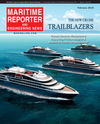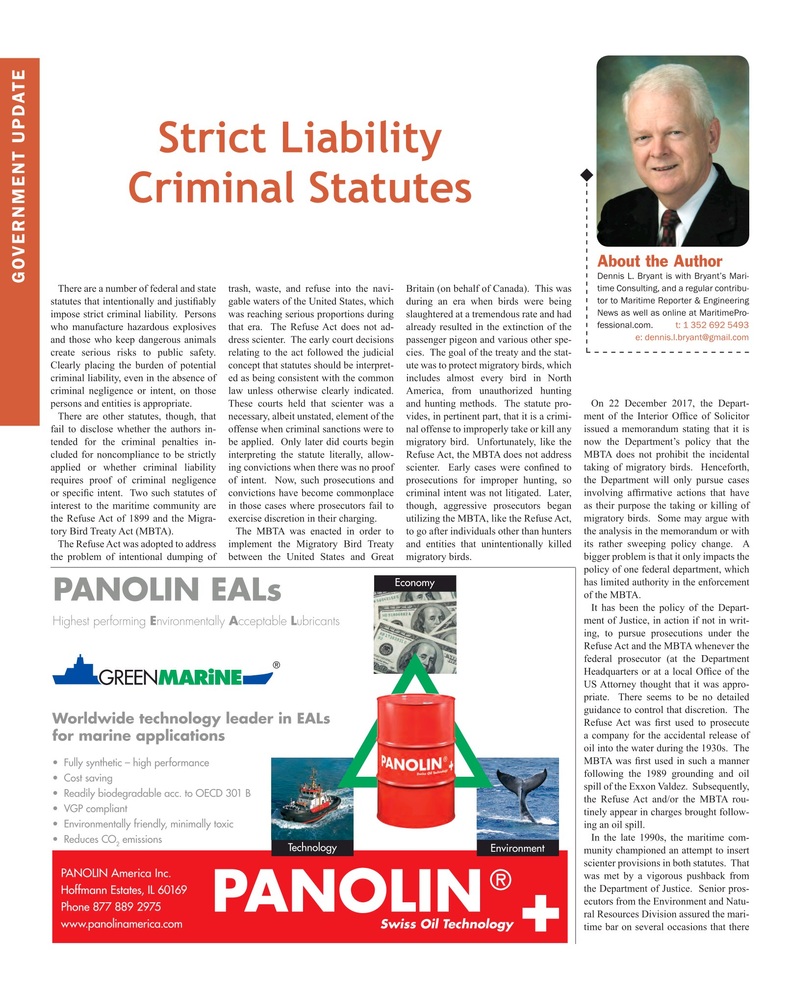
Page 12: of Maritime Reporter Magazine (February 2018)
Cruise Ship Annual
Read this page in Pdf, Flash or Html5 edition of February 2018 Maritime Reporter Magazine
Strict Liability
Criminal Statutes
About the Author
Dennis L. Bryant is with Bryant’s Mari-
GOVERNMENT UPDATE time Consulting, and a regular contribu-
There are a number of federal and state trash, waste, and refuse into the navi- Britain (on behalf of Canada). This was tor to Maritime Reporter & Engineering statutes that intentionally and justi? ably gable waters of the United States, which during an era when birds were being
News as well as online at MaritimePro- impose strict criminal liability. Persons was reaching serious proportions during slaughtered at a tremendous rate and had fessional.com. t: 1 352 692 5493 who manufacture hazardous explosives that era. The Refuse Act does not ad- already resulted in the extinction of the e: [email protected] and those who keep dangerous animals dress scienter. The early court decisions passenger pigeon and various other spe- create serious risks to public safety. relating to the act followed the judicial cies. The goal of the treaty and the stat-
Clearly placing the burden of potential concept that statutes should be interpret- ute was to protect migratory birds, which criminal liability, even in the absence of ed as being consistent with the common includes almost every bird in North criminal negligence or intent, on those law unless otherwise clearly indicated. America, from unauthorized hunting persons and entities is appropriate. These courts held that scienter was a and hunting methods. The statute pro- On 22 December 2017, the Depart-
There are other statutes, though, that necessary, albeit unstated, element of the vides, in pertinent part, that it is a crimi- ment of the Interior Of? ce of Solicitor fail to disclose whether the authors in- offense when criminal sanctions were to nal offense to improperly take or kill any issued a memorandum stating that it is tended for the criminal penalties in- be applied. Only later did courts begin migratory bird. Unfortunately, like the now the Department’s policy that the cluded for noncompliance to be strictly interpreting the statute literally, allow- Refuse Act, the MBTA does not address MBTA does not prohibit the incidental applied or whether criminal liability ing convictions when there was no proof scienter. Early cases were con? ned to taking of migratory birds. Henceforth, requires proof of criminal negligence of intent. Now, such prosecutions and prosecutions for improper hunting, so the Department will only pursue cases or speci? c intent. Two such statutes of convictions have become commonplace criminal intent was not litigated. Later, involving af? rmative actions that have interest to the maritime community are in those cases where prosecutors fail to though, aggressive prosecutors began as their purpose the taking or killing of the Refuse Act of 1899 and the Migra- exercise discretion in their charging. utilizing the MBTA, like the Refuse Act, migratory birds. Some may argue with tory Bird Treaty Act (MBTA). The MBTA was enacted in order to to go after individuals other than hunters the analysis in the memorandum or with
The Refuse Act was adopted to address implement the Migratory Bird Treaty and entities that unintentionally killed its rather sweeping policy change. A the problem of intentional dumping of between the United States and Great migratory birds. bigger problem is that it only impacts the policy of one federal department, which has limited authority in the enforcement of the MBTA.
PANOLIN EALs
It has been the policy of the Depart- ment of Justice, in action if not in writ-
Highest performing Environmentally Acceptable Lubricants ing, to pursue prosecutions under the
Refuse Act and the MBTA whenever the federal prosecutor (at the Department
Headquarters or at a local Of? ce of the
US Attorney thought that it was appro- priate. There seems to be no detailed guidance to control that discretion. The
Worldwide technology leader in EALs
Refuse Act was ? rst used to prosecute a company for the accidental release of for marine applications oil into the water during the 1930s. The
MBTA was ? rst used in such a manner t'VMMZTZOUIFUJDoIJHIQFSGPSNBODF following the 1989 grounding and oil t$PTUTBWJOH spill of the Exxon Valdez. Subsequently, t3FBEJMZCJPEFHSBEBCMFBDDUP0&$%# the Refuse Act and/or the MBTA rou- t7(1DPNQMJBOU tinely appear in charges brought follow- t&OWJSPONFOUBMMZGSJFOEMZ
NJOJNBMMZUPYJD ing an oil spill.
In the late 1990s, the maritime com- t3FEVDFT$0 emissions 2 munity championed an attempt to insert scienter provisions in both statutes. That
PANOLIN America Inc.
was met by a vigorous pushback from the Department of Justice. Senior pros-
Hoffmann Estates, IL 60169 ecutors from the Environment and Natu-
Phone 877 889 2975 ral Resources Division assured the mari- www.panolinamerica.com time bar on several occasions that there
MR #2 (10-17).indd 12 MR #2 (10-17).indd 12 2/8/2018 4:11:39 PM2/8/2018 4:11:39 PM

 11
11

 13
13
